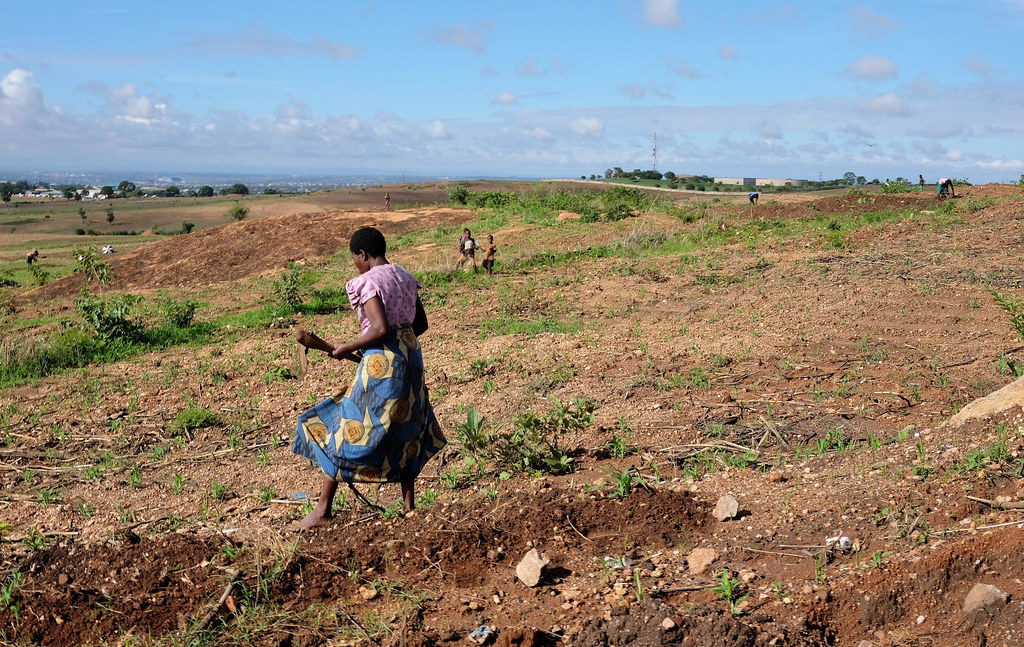A new study explores how the psychological concept of gender undergoes a shift in meaning when intersecting with the culture and lives of people in rural Malawi. University of Oslo researchers Johanna Adolfsson and Ole Madsen published their study in Theory and Psychology. They contend that the use and understanding of ‘gender’ in rural Malawi are much broader than its individualized usage in psychology. The shift in meaning that may occur because of global policies has many consequences for people on the receiving end of international aid.

The Global Mental Health Movement (GMHM), which seeks to reduce the ‘treatment gap’ in countries in the global south, recently received a boost when the UN Sustainable Development Goals (SDG) included mental health as a top priority. While researchers have questioned the legitimacy of this movement, including claims of efficacy and ethics, a psychological discourse has been increasingly embraced by international policymakers.
After being criticized for disturbing local economies and instigating conflict in some regions, the global aid sector moved toward adopting psychosocial models that administer policies based on individualized and psychologized concepts such as “resilience,” “self-actualization,” and “empowerment.” Researchers have contested that many of these psychological concepts are founded upon post-enlightenment modern Western values, such as meritocracy, individualism, and materialism.
The movement to universalize the definition of human suffering and to homogenize mental distress has been problematized by many who insist that socio-cultural factors and interpersonal relationships play an essential role in understanding and managing emotional pain.
Amidst these trends and conversations, the authors of this article investigate how the psychologized definition of gender, which is used by most policy actors, enters the global discourse and is reframed, restructured, and negotiated in rural Malawi, in sub-Saharan Africa.
The “gender turn,” which began in the 1970s and then gained popularity amongst global development and policy actors in the early 2000s, focused on addressing the needs of young women, framing them as an untapped economic resource. This global movement was premised on the discourse of individual freedom, agency, and self-efficacy.
While organizations like the UNICEF have maintained that women’s empowerment and global poverty are intricately related, critics have warned against such simplistic economic framing of complex problems, which have roots in structural discrimination, systemic corruption, and colonial exploitation. Recent studies have linked such systemic socio-cultural factors like poverty to mental and emotional distress. Thus, these critics argue that women’s issues, through the discourse of empowerment and self-reliance, are used to bolster neoliberal agendas of economic growth.
The authors of this study write that Malawi is one of the poorest nations in the world, and is considered a “donor darling.” It has a high presence of non-governmental (NGOs) and other aid organizations that disseminate messages about SDG 5 (“attain gender equality and empower all women and girls”) through mass media and other campaigns.
The study was conducted by performing a theoretical thematic analysis on data collected through focus group discussions, and formal and informal personal interviews with participants in a rural agricultural area. Due to high rates of poverty, unplanned teenage pregnancies, poor infrastructure, and low levels of education, NGO intervention and gender equality programs are heavy in this area.
Rural Malawi is the point of intervention of many of these policies and messages, and over time the word ‘gender’ has taken on a different life and a different meaning in the Chichewa language — “not differentiating between men and women at work.” In this framing, ‘gender’ is understood as something to be practiced to lessen gender inequality.
In contrast to the way gender is understood and negotiated in the industrialized world as something universal and individual, the authors found that gender took on a different meaning among the people of rural Malawi.
“Generally, participants agreed that gender is part of development introduced by various international and national NGOs implementing programs in the villages. Most participants saw the shift to gender as related to work and daily practices previously tied to separate gendered roles, such as construction work, farming, cooking, washing, and cleaning… Thus, gender could be understood as ‘not differentiating between men and women at work’ and the Chichewan ‘jenda’ translated as ‘gender equality.’”
The authors use Haslam’s idea of ‘concept creep’ to show how psychological approaches can undergo shifts in meaning and how these new meanings can influence peoples’ understanding of themselves. Other researchers have spoken of a similar reification and manipulation of emotional experience caused by linguistic colonization.
Men conceptualized ‘gender’ (gender equality) as a practice they felt mostly positively about. They also clarified that ‘gender’ was new and came from outside, from “high-levels” to “low levels,” in other words, from outside sources like NGOs, the first author (a White woman), and the research assistant (an English-speaking Malawian woman) to them, the locals.
Similar to men, women also perceived ‘gender’ as new and as something which entered their lives from the outside world. They viewed this restructuring of the division of labor in a positive light, as doing ‘gender’ allowed them to be less vulnerable and dependent on men.
As opposed to the psychological concept of gender, which is individualized as something that people have, in rural Malawi, gender was understood as something you collectively do to reap collective benefits. As a result, the authors write:
“With this qualitative stretch, gender has come to be associated with normative concepts such as ‘moral,’ ‘responsibility,’ and ‘agency,’ in turn connoting managerial concepts of ‘time,’ ‘money,’ ‘efficiency,’ and the like.”
The authors suggest that, in rural Malawi, since the concept of ‘gender’ has an expanded definition, which influences people’s meaning-making experience about themselves and others, it has led to some negative consequences.
Some male participants in the focus group suggested that there is a disconnect between what NGOs say ‘gender’ is and how they practice it. They allude to the sole focus of NGOs on girls’ and women’s empowerment. In other words, to them, the exclusion of men indicates that what NGOs are doing is not truly ‘gender,’ because ‘gender’ is considered something that is done for everyone and by everyone.
Despite the generally positive feelings around ‘gender,’ many women feared not living up to the expectations of ‘gender,’ often defined by NGOs as staying in school and avoiding unplanned pregnancies. They reported that their inability to do so made them feel like a failure. Moreover, others mentioned that dropping out of school and becoming pregnant could lead to a monetary fine to be paid to the local authorities. An economic sanction of this kind has dire consequences in a region where poverty is rampant.
This, in turn, led to girls facing stigma and shame in the community. Girls’ bodies and behavior become the concern of the society, in turn taking away some of the agency that these rules were supposed to give them. Thus, the singular focus of aid agencies on women being held responsible for unplanned pregnancies, as evidenced by the fines their families have to incur, creates an unbalanced distribution of reproductive responsibility. The authors write:
“This one-sided way of assigning gendered responsibilities like pregnancies onto women and girls legitimizes the irresponsible behavior of the men who abandon them with the sole responsibility of child-rearing.”
Moreover, by placing the whole responsibility of empowerment on individual women and punishing them for perceived transgressions, the NGOs and governmental organizations minimize the effects of cultural and economic factors like structural poverty and lack of resources on why girls drop out of school or get pregnant, and further internalize this perceived misbehavior.
“The individual focus on gender may indirectly justify male independence while assigning even more expectations and responsibility to women and girls already struggling to cope in a society permeated with inequity,” the authors write.
Individual interviews with women found participants admitting that there was no ‘gender’ in their community since the division of labor remained sex-specific because child-rearing and domestic labor was still managed by women. How neoliberal ‘gender’ messages, which position women as a global investment, are spread by government agencies has an unforeseen consequence. Women end up doing more work by entering traditional male fields, whereas men end up doing less as they rarely contribute to household work.
This, along with the earlier stated reasons, is why women thought that ‘gender’ seemed to benefit men more than women. Thus, contrary to what many developmental policymakers aimed for, gender equality was sometimes actually diminished by their efforts since domestic work is devalued across the world.
Lastly, since ‘gender’ is constructed collectively, and practiced with others instead of possessed by an individual, many measures of calculating gender equality miss the complexity of these ways and instead decontextualize the lived reality of ‘gender’ in rural Malawi.
Given the complexities of culture, the realities of socio-economic inequalities, and the intricacies of language, it is then essential to understand how Western psychological concepts are contextualized and reframed in many indigenous societies.
****
Adolfsson, J.S. & Madsen, O.J. (2019). “Nowadays there is gender”: “Doing” global gender equality in rural Malawi. Theory and Psychology. Published Online First: 18 October 2019. DOI: 10.1177/0959354319879507 (Link)















Nice and interesting post. Thank you!
Report comment
“This one-sided way of assigning gendered responsibilities like pregnancies onto women and girls legitimizes the irresponsible behavior of the men who abandon them with the sole responsibility of child-rearing.”
And it denies, as the – way too paternalistic – psychological and psychiatric industries systemically do, the possibility that the women or girls were raped. And covering up child abuse and rape has been the number one societal function of our psychological and psychiatric industries for over a century.
https://www.indybay.org/newsitems/2019/01/23/18820633.php?fbclid=IwAR2-cgZPcEvbz7yFqMuUwneIuaqGleGiOzackY4N2sPeVXolwmEga5iKxdo
https://www.madinamerica.com/2016/04/heal-for-life/
Rape and child abuse never happens, according to our insane and highly DSM deluded “mental health” workers. Oh, that’s because no “mental health” worker may ever bill any insurance company for ever helping any child abuse survivor ever, by DSM design.
https://www.psychologytoday.com/us/blog/your-child-does-not-have-bipolar-disorder/201402/dsm-5-and-child-neglect-and-abuse-1
“How neoliberal ‘gender’ messages, which position women as a global investment, are spread by government agencies has an unforeseen consequence. Women end up doing more work by entering traditional male fields, whereas men end up doing less as they rarely contribute to household work.”
Yes, that’s what’s already happened in American. And it’s actually to the point in America that if you’ve earned and saved enough money to be a stay at home mom, you are actually a target of the psychologists and psychiatrists, for choosing to be a stay at home mom, and properly raise your children.
And this targeting of stay at home moms, by the psychologists and psychiatrists, is helping to destroy American families and America in general, from within. It is by the design of the globalist banksters, NGOs, and their lunatic “mental health” minion, as somewhat pointed out in this documentary.
https://www.youtube.com/watch?v=CyWH8NJGRsA
“This, along with the earlier stated reasons, is why women thought that ‘gender’ seemed to benefit men more than women.” Yes, it’s a satanically paternalistic psychological theology, that will destroy other countries, just like it’s destroying America from within today. “Western psychological concepts” are destroying America and Western civilization, from within. A confession from within your own ranks.
https://www.amazon.com/Pedophilia-Empire-Chapter-Introduction-Disorder-ebook/dp/B0773QHGPT
Leave the rural Malawi people alone, psychologists, and start confessing to the fact your paternalistic psychological theories are destroying Western civilization from within. “The Global Mental Health Movement (GMHM),” should be ended.
Both the psychologists’ and psychiatrists’ scientific fraud based, primarily child abuse and rape covering up, DSM “bible” theology is a disaster. And it is destroying Western civilization from within, so it should NOT be exported internationally. It needs to be ended.
And America needs a return to the rule of law instead. The power needs to be taken away from the globalist banksters’ “omnipotent moral busy body” “mental health” lunatics.
Report comment
Seems like the woman on the photo is quite happy with her work, but still maybe she is too young
Report comment